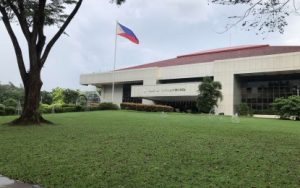MANILA, PHILIPPINES – A measure providing for the development of sustainable cities and communities in the country hurdled committee level at the House of Representatives.

During the hearing on Wednesday, the House Committee on Housing and Urban Development approved the committee report on House Bill 71, or the proposed Sustainable Cities and Communities Act, which aims to fulfill the promise of economic and social inclusion of urbanization.
Committee chair Jose Francisco Benitez, author of the bill, said urbanization provides resources and opportunities for employment, livelihood, services and innovation, driving rural-urban migration.
Benitez said the proposed law would improve, bolster and strengthen the urban development and planning function of the Department of Human Settlements and Urban Development and the offices within the local government units (LGUs).
“So that the framework of the New Urban Agenda becomes part and parcel of the everyday life of our fellow Filipinos all over the country,” he said.
The New Urban Agenda is about people, planet, prosperity, peace and partnerships in urban settings. It was adopted at the United Nations Conference on Housing and Sustainable Urban Development (Habitat III) in Quito, Ecuador in 2016.
Under the bill, all cities and municipalities classified as urban by the Philippine Statistics Authority (PSA) are mandated to align their plans, programs and activities toward the full implementation of the proposed law.
Aside from the New Urban Agenda, the guiding framework for the local government units are the Ambisyon 2040 and the Philippine Standards for Sustainable Cities and Communities.
The bill also mandates the creation of a National Housing and Urban Development Sector Plan (NHUDSP) to provide short-term, medium-term and long-term strategic plans to achieve the goals of the proposed law.
The NHUDSP shall also generate estimates and projections to determine present and future demand for infrastructures and services in urban areas, and shall identify policy and program interventions to address challenges to sustainable urban development, and specific periodic targets and indicators and investment requirements.
The panel likewise approved the substitute bill to HB 455 and 13 other measures on the Rental Housing Subsidy Program.
The creation of this program would provide social protection and support to informal settler families (ISFs) in accessing the formal housing market.
It would be made an option to address the temporary relocation of displaced families due to natural and man-made disasters.

Leave A Comment